

Tony Stiles sur Twitter : "#Libertarians are like Greek Gods.
Libertarian socialism. Overview[edit] Libertarian socialism is a Western philosophy with diverse interpretations, though some general commonalities can be found in its many incarnations.
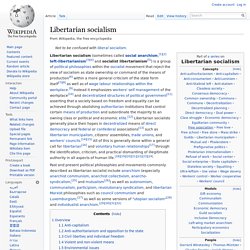
Its proponents generally advocate a worker-oriented system of production and organization in the workplace that in some aspects radically departs from neoclassical economics in favor of democratic cooperatives or common ownership of the means of production (socialism).[33] They propose that this economic system be executed in a manner that attempts to maximize the liberty of individuals and minimize concentration of power or authority (libertarianism).
August 17, 1860 edition of libertarian Communist publication Le Libertaire edited by Joseph Déjacque. In a chapter recounting the history of libertarian socialism, economist Robin Hahnel relates that thus far the period where libertarian socialism has had its greatest impact was at the end of the 19th century through the first four decades of the twentieth century. Libertarian socialism. Cultural anthropology. Cultural anthropology is a branch of anthropology focused on the study of cultural variation among humans and in contrast to the social anthropology perceives the cultural variation more as an independent "variable" than the dependent one.
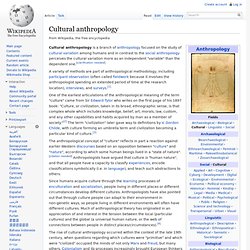
[clarification needed] A variety of methods are part of anthropological methodology, including participant observation (often called fieldwork because it involves the anthropologist spending an extended period of time at the research location), interviews, and surveys.[1] One of the earliest articulations of the anthropological meaning of the term "culture" came from Sir Edward Tylor who writes on the first page of his 1897 book: "Culture, or civilization, taken in its broad, ethnographic sense, is that complex whole which includes knowledge, belief, art, morals, law, custom, and any other capabilities and habits acquired by man as a member of society.
Ontology. Parmenides was among the first to propose an ontological characterization of the fundamental nature of reality.
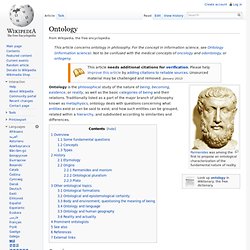
Overview[edit] Some fundamental questions[edit] Principal questions of ontology include: "What can be said to exist? ""Into what categories, if any, can we sort existing things? "" Rule utilitarianism. Rule utilitarianism is a form of utilitarianism that says an action is right as it conforms to a rule that leads to the greatest good, or that "the rightness or wrongness of a particular action is a function of the correctness of the rule of which it is an instance.
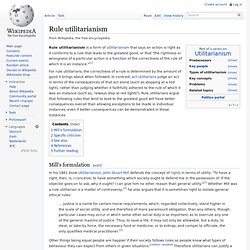
"[1] For rule utilitarians, the correctness of a rule is determined by the amount of good it brings about when followed. In contrast, act utilitarians judge an act in terms of the consequences of that act alone (such as stopping at a red light), rather than judging whether it faithfully adhered to the rule of which it was an instance (such as, "always stop at red lights"). Rule utilitarians argue that following rules that tend to lead to the greatest good will have better consequences overall than allowing exceptions to be made in individual instances, even if better consequences can be demonstrated in those instances.
Green libertarianism. A green libertarian would be an individual who adheres to libertarian political philosophy as well as to green ideology.
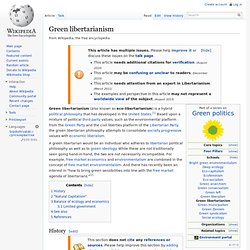
While these are not traditionally seen going hand-in-hand, the two are not necessarily incompatible. For example, free market economics and environmentalism are combined in the concept of free market environmentalism. And there has recently been an interest in "how to bring green sensibilities into line with the free market agenda of libertarians. Christian libertarianism. As with secular libertarianism, socialism, fascism, and crony capitalism are strongly opposed, as is theocracy.
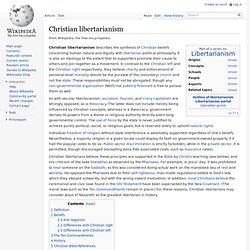
The latter does not include merely being influenced by Christian concepts; whereas in a theocracy, government derives its powers from a divine or religious authority directly exercising governmental control. The use of force by the state is never justified to achieve purely political, social, or religious goals, but is reserved solely to uphold natural rights. Decentralization. Decentralization (or decentralisation) is the process of redistributing or dispersing functions, powers, people or things away from a central location or authority.[1][2] While centralization, especially in the governmental sphere, is widely studied and practiced, there is no common definition or understanding of decentralization.
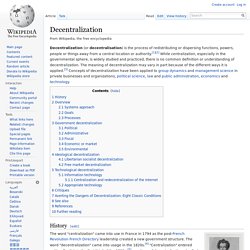
The meaning of decentralization may vary in part because of the different ways it is applied.[3] Concepts of decentralization have been applied to group dynamics and management science in private businesses and organizations, political science, law and public administration, economics and technology. History[edit] The word "centralization" came into use in France in 1794 as the post-French Revolution French Directory leadership created a new government structure. Decentralization was one of ten Megatrends identified in this best seller. According to a 1999 United Nations Development Programme report: Right-libertarianism. Right-libertarianism is a term used by some political analysts, academics, and media sources to describe those libertarian political philosophies which advocate both self-ownership and limited government[1]; a belief that extends to supporting strong private property rights and free-market capitalism in the context of a small state.
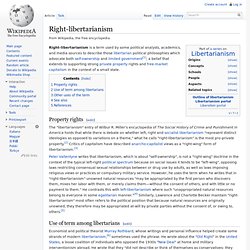
Property rights[edit] The "libertarianism" entry of Wilbur R. Miller's encyclopedia of The Social History of Crime and Punishment in America holds that while there is debate on whether left, right and socialist libertarianism "represent distinct ideologies as opposed to variations on a theme," what he calls "right-libertarianism" is the most pro-private property.[2] Critics of capitalism have described anarcho-capitalist views as a "right-wing" form of libertarianism.[3] Use of term among libertarians[edit] Some pro-property libertarians reject association with either term "right" or "left". Natural-rights libertarianism. Natural-rights libertarianism, also known as deontological libertarianism, philosophical libertarianism,[1] deontological liberalism, rights-theorist libertarianism, natural rights-based libertarianism, or libertarian moralism,[2] refers to the view that all individuals possess certain natural or moral rights, mainly a right of individual sovereignty, and that therefore acts of initiation of force and fraud are rights-violations and that is sufficient reason to oppose those acts.
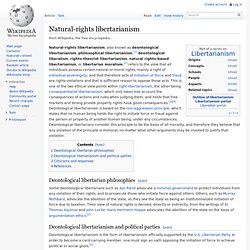
Deontological libertarian philosophies[edit] Some deontological libertarians such as Ayn Rand advocate a minimal government to protect individuals from any violation of their rights, and to prosecute those who initiate force against others. Others, such as Murray Rothbard, advocate the abolition of the state, as they see the state as being an institutionalized initiation of force due to taxation. Their view of natural rights is derived, directly or indirectly, from the writings of St. Mutualism (economic theory) Protectionism. Protectionism is the economic policy of restraining trade between states (countries) through methods such as tariffs on imported goods, restrictive quotas, and a variety of other government regulations designed to allow (according to proponents) fair competition between imports and goods and service produced domestically.[1] This policy contrasts with free trade, where government barriers to trade are kept to a minimum.

In recent years, it has become closely aligned with anti-globalization. The term is mostly used in the context of economics, where protectionism refers to policies or doctrines which protect businesses and workers within a country by restricting or regulating trade with foreign nations.[2]
Social democracy. Social democracy is a political ideology that officially has as its goal the establishment of democratic socialism through reformist and gradualist methods.[1] Alternatively, social democracy is defined as a policy regime involving a universal welfare state and collective bargaining schemes within the framework of a capitalist economy. It is often used in this manner to refer to the social models and economic policies prominent in Western and Northern Europe during the later half of the 20th century.[2][3] History First International era, 1863–1889 Although Lassalle was not a Marxist, he was influenced by the theories of Marx and Engels, and he accepted the existence and importance of class struggle. The ADAV's party newspaper was called Der Sozialdemokrat ("The Social Democrat"). Though the SDAP was not officially Marxist, it was the first major working-class organization to be led by Marxists and Marx and Engels had direct association with the party.
Keir Hardie. Centrism. Non-aggression principle. Supporters of the NAP often appeal to it in order to argue for the immorality of theft, vandalism, assault, and fraud. In contrast to nonviolence, the non-aggression principle does not preclude violence used in self-defense or defense of others.[2] Many supporters argue that NAP opposes such policies as victimless crime laws, coercive taxation, and military drafts. NAP is the foundation of most present-day libertarian philosophies.[3][4][5] Justifications[edit] The principle has been derived by various philosophical approaches, including: Definitional issues[edit] Consequentialist libertarianism. Consequentialist libertarianism (also known as libertarian consequentialism[1]) refers to the libertarian position that is supportive of a free market and strong private property rights only on the grounds that they bring about favorable consequences, such as prosperity or efficiency.[2] What consequentialist libertarians advocate is derived simply through cost-benefit calculation, taking a broad account of consequences.[3] It is contrasted with deontological libertarianism, also known as "natural-rights libertarianism," which considers the initiation of force and fraud to be immoral, regardless of consequences.[4][5] Unlike deontological libertarians, consequentialist libertarians do not necessarily see all cases of initiation of force as immoral and never see it as inherently immoral (i.e., they do not express a belief in natural rights).
Notable consequentialist libertarians[edit] Milton Friedman,[10] David D. Republicanism in the United States. Republicanism is a political values system that has been a major part of American civic thought since the American Revolution.[1] It stresses liberty and "unalienable" rights as central values, makes the people as a whole sovereign, rejects aristocracy and inherited political power, expects citizens to be independent in their performance of civic duties, and vilifies corruption.[2] American republicanism was founded and first practiced by the Founding Fathers in the 18th century.
This system was based on Ancient Greco-Roman, Renaissance, and English models and ideas.[3] It formed the basis for the American Revolution and the consequential Declaration of Independence (1776) and the Constitution (1787), as well as the Gettysburg Address (1863).[4] The term "republicanism" is derived from the term "republic", but the two words have different meanings. The Capitol exalted classical republican virtues[9] The American Revolution[edit] Republican virtues[edit] Progressive education. Progressive education is a pedagogical movement that began in the late nineteenth century and has persisted in various forms to the present.
Left-libertarianism. Left-libertarianism (or left-wing libertarianism)[note 1] names several related but distinct approaches to politics, society, culture, and political and social theory, which stress both individual freedom and social justice. Unlike right-libertarians, they believe that neither claiming nor mixing one's labor with natural resources is enough to generate full private property rights,[1][2] and maintain that natural resources (land, oil, gold, trees) ought to be held in some egalitarian manner, either unowned or owned collectively.[2] Left-libertarianism can refer generally to three related and overlapping schools of thought:
Geolibertarianism. Neoliberalism. Neoliberalism is a label for economic liberalism whose advocates support economic liberalizations, free trade and open markets, privatization, deregulation, and enhancing the role of the private sector in modern society.[1][2][3] Neoliberalism was an economic philosophy that emerged among European liberal scholars in the 1930s attempting to trace a so-called ‘Third’ or ‘Middle Way’ between the conflicting philosophies of classical liberalism and collectivist central planning.[4] The impetus for this development arose from a desire to avoid repeating the economic failures of the early 1930s which conventional wisdom of the time tended to blame on unfettered capitalism. In the decades that followed, neoliberal theory tended to be at variance with the more laissez-faire doctrine of classical liberalism and promoted instead a market economy under the guidance and rules of a strong state, a model which came to be known as the social market economy.
American scholar Robert W. Populism. Populism is a political doctrine in which one sides with "the people" against "the elite".[1] Populist sentiment contributed to the American Revolutionary War, and continued to shape the young United States afterward.[2] While for much of the twentieth century populism was considered[by whom?] Libertarian Marxism. Libertarian Marxism includes such currents as council communism, left communism, Socialisme ou Barbarie Lettrism/Situationism and operaismo/autonomism, and New Left.[8] Libertarian Marxism has often had a strong influence on both post-left and social anarchists. Neoconservatism. Socialism. Modern liberalism in the United States. Modern American liberalism combines social liberalism with support for social justice and a mixed economy.